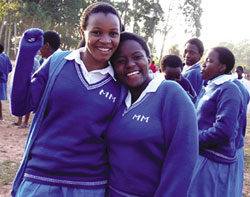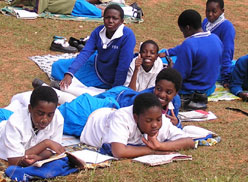Towards equality for women
For young women at the Marymount School for Girls, education is their hope for the future
By Betty Ann Martin
October 2005
Return to Table of Contents
Print Article
It is 3:00 a.m. and dark outside. I am sitting in a classroom looking out over a sea of young women quietly poring over their textbooks. Final exams are fast approaching. The determination of these students inspires me. It is an image I will not soon forget.

Betty Ann Martin
This November I return to Canada after spending the past three and a half years as a Scarboro lay missioner in Malawi teaching at the Marymount Secondary School for Girls. The school had its beginnings when the bishop of the Diocese of Mzuzu, Jean-Louis Jobidon, a Canadian and a Missionary of Africa, decided that the boys and girls of the community would no longer attend the same school at the secondary level. A separate school for female students would provide the focus and opportunity for advancement that usually went to male students.
Chaminade, a new school for the boys, would be run by the Marianist Fathers/Brothers in Karonga, north of Mzuzu. The girls would attend Marymount, a boarding school that would be built in Mzuzu and managed by the Canadian MIC Sisters (Missionaries of the Immaculate Conception) with the help of the laity. A site for Marymount was chosen high on a hill above Mzuzu, with an extraordinary view. Construction began in 1962 and some classes commenced the following year.
The Sisters, some of whom are still here in Mzuzu, worked hard to provide quality education for Catholic girls in Malawi, preparing them for future leadership roles in family, Church and State. Today the student body is comprised of other Christian denominations and faith traditions, including Muslims.
The Sisters' objective was to provide opportunities for students to broaden their horizons spiritually, intellectually, emotionally, physically and socially. This was a major undertaking in a country where many men were well educated and well traveled and women were little more than servants and sex objects.
Forty-three years later, things are gradually changing, but as the saying goes, old habits die hard. On the one hand Marymount has produced government officials, doctors, lawyers, professors, entrepreneurs and the country's first woman Inspector General of the Police Department.
On the other hand, many girls and boys of Malawi, depending on what tribe they come from, are expected to go through a rite of initiation at a very young age, which obviously would not only be traumatic for them but leave them susceptible to AIDS. At the end of one of my school years here, having heard about this, I took all 170 of my students to the playing field to talk to them before they went home and I asked them if this story was true. They said yes depending on what tribe you were from. One of my 13 year olds said, "How do we say no to our parents?" Would I have been able to say no?
This is just one of the dilemmas I have been faced with-our cultural differences-and I remind myself that I am here to BE with the people, not to change them. But it makes it all the more heartbreaking.


Students at the Marymount School for Girls, Mzuzu, Malawi
One of my students died of AIDS in April. In the cemetery, I sat on the ground next to her father's grave; he had died about six years before. In this country, death is everywhere. I leave Malawi at the end of this year and I wonder how many more of my students will die before I have a chance to see them again or more importantly before they have a chance at a future? What is the point of this wonderful education if some of the old ways and traditions, in addition to poverty and disease, continue to rob youth of a life they work so hard to build?
The MIC Sisters started this excellent school and although not directly involved in the running of it anymore, they continue their campaign against AIDS and their involvement in all aspects of community life. Marymount continues to flourish through the tireless efforts of the teachers, administrators and support staff. However, equality for women is still a long way off. Are we winning the battle for good education but losing the struggle to gain recognition for the dignity of women and children?
Last year, Marymount surpassed all other schools in the country to achieve the highest academic achievements overall and in Science. We were all very excited with these results. As well, 50 girls were chosen to go to university (there are 800 places in the country). In preparation for this year's exams, the students have been going to their classrooms at 3:00 in the morning to study for two hours before classes begin. The Form master and I, the Form mistress, have been sitting with them to encourage them. This has also been my duty week when I am expected to open and close the school, receive visitors and discipline students. With so much excitement and activity, I certainly will not forget my last term at Marymount.
After school today, the girls were practising their graduation procession, but unlike our usual procession song, "Pomp and Circumstance", they are coming in with an African dance, in perfect unison with each other. The more they practise it, the looser and more enthusiastic they get. I stood there and cried when I saw the joy on their faces. I thought of how hard they and their families have worked to get them to where they are and I was so PROUD of them. I am lucky to have had this experience to walk with them awhile.
Return to Table of Contents
Print Article